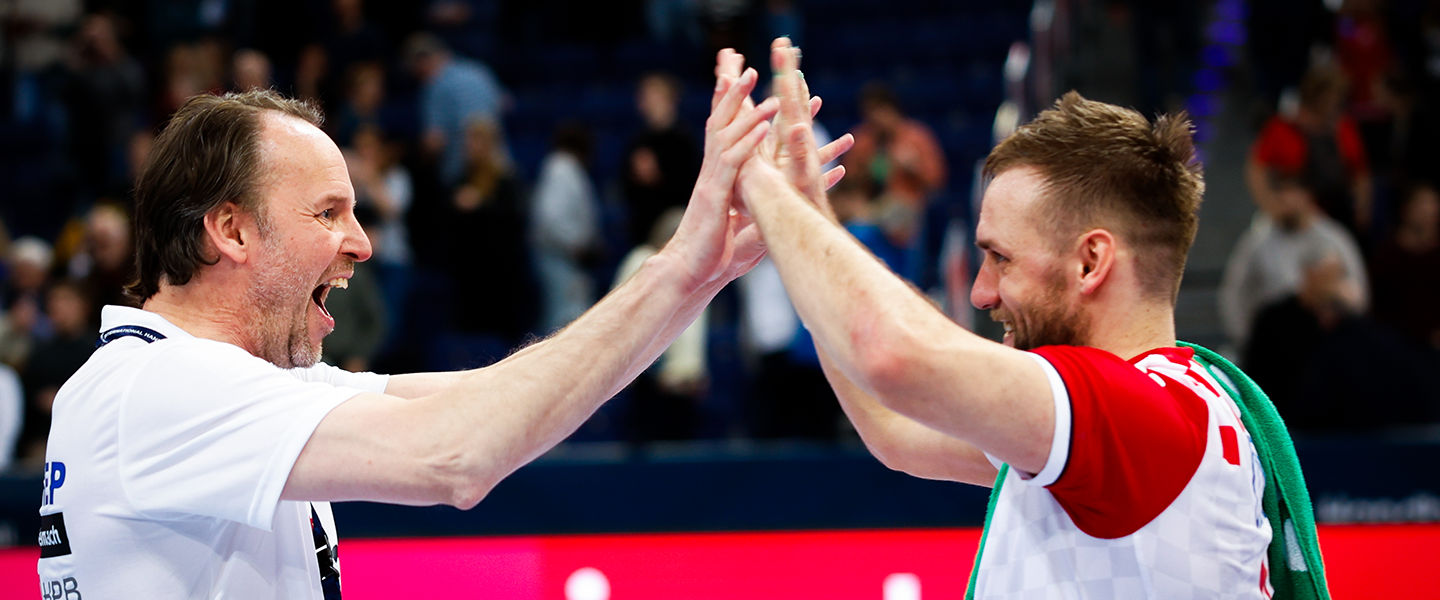Passion, time and philosophy: Sigurdsson’s Croatia starting to take shape
19 Mar. 2024

“I knew they were passionate about the sport but I had no idea that they were that passionate about the sport,” said new Croatia coach Dagur Sigurdsson to ihf.info about the Croatian fans after his side completed their third and final game of the Men’s Olympic Qualification Tournament #2 in Hanover.
That 34:22 victory over Algeria on Sunday night followed victories against Austria (35:29) and Germany (33:30), the 100% record ensuring a ticket to the Paris 2024 Olympic Games.
“They are absolutely crazy about the sport,” he added. “It’s not one moment, it’s just the overall joy and the support we have got.”
Splitting after seven years with the Japan men’s side was hard and it is understandable the 50-year-old still has affection for the Asian country, especially after starting his coaching career there in the early 2000s.
“You can say that it was not my plan to leave,” said the Icelandic coach when asked if the choice to coach Croatia was a spontaneous one. “When this came up, I was really excited to take the next step with the Croatian team, I asked Japan for understanding and I'm really thankful that they could accept it.
“Of course, it took a little bit time to work out, but in the end, we will both benefit from this and I'm hoping that I can keep on helping Japan in the future.”
And in making that transition from Japan to Croatia via Germany, Sigurdsson could rely on his own, personal team.
“I'm a lucky guy, you know? I have close family. I’m really thankful for them and they supported me,” he said about making the decision to change continents. “My brother came with me when I went to Zagreb the first time (to discuss the contract), my best friend came and my girlfriend came to watch these games.”
In Japan, Sigurdsson leaves a team who have moved ahead of the Republic of Korea in their region of Asia and is becoming more equipped to take on the strength of the Middle East countries, led by Qatar.
More importantly, he led Japan to competitively qualify for their first Olympic Games since 1988 – they hosted Tokyo 2020 – and this success, combined with Croatia’s qualification this past weekend, has seen the ultra-rare, if not unique, occurrence of the same coach qualifying two teams to the same Olympic Games.
“I think I'm not the right guy to ask,” joked Sigurdsson when asked if he knows if he is the only coach in history to have achieved that feat. “For me, personally, it’s a strange circumstance that that two teams that I work for are qualified, two of the 12 who will be there.
“The feeling is really good, it's pretty nice,” he added about making it a double with Croatia in Hanover. “I'm just happy for the players, the staff and the fans that we managed to get this.”
With just six training sessions and three games with his team so far, Sigurdsson has been able to see the whole squad in action after a full rotation in the final game against Algeria.
In the key game against Germany, Sigurdsson, who guided the Germans to European Championship glory in 2016, admitted that his side had finally “clicked” after 20 minutes and then the result became clear, if not Olympic qualification, which was confirmed a few hours later when Austria defeated Algeria.
But he was quick to shoot down any talk of having made a difference just yet.
“Always, when you take over a team, you cannot copy-paste anything from the other teams you have coached,” he said. “You have to tailor-make more or less everything on the players you have and on the weapons you have on your team and try to get the strength out of each player.
“That goes for defence and offence, so this coaching job is more or less now finding a balance and using the players in their best way. I just tried to put in small details and make sure that the team is in the right balance. I didn't do much more than that. I don't even know the names of the tactics.
“I would not take so much from this game,” he added about the clash with Algeria which did not affect the qualification places. “It was little bit ‘after the day’, the day after the qualification, so you have to take that into account.”
Ahead of their Germany clash, Igor Karacic told ihf.info that if his side should qualify for Paris it would be a “good thing” as they could have up to 50 days together with Sigurdsson, a key period together for the Icelandic coach to get his messaging and style of work across.
“To get this summer [to prepare] was absolutely crucial for me to put my stamp on the team,” said Sigurdsson, who also coached Austria from 2008-10.
“This is also important for future of the team, that we get some time to drill the team and I can push my philosophy a little bit into the team. We will have time for that in the summer and that is also important for the future, for the next World Championship (Croatia are hosting in 2025). I'm really happy with that.”

